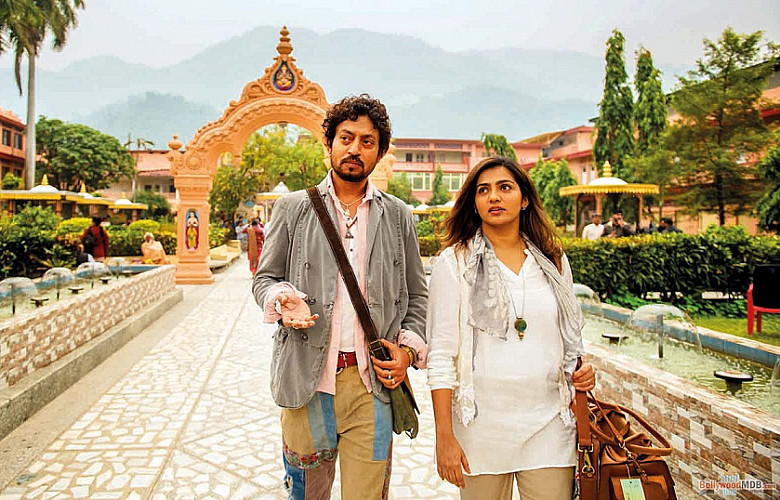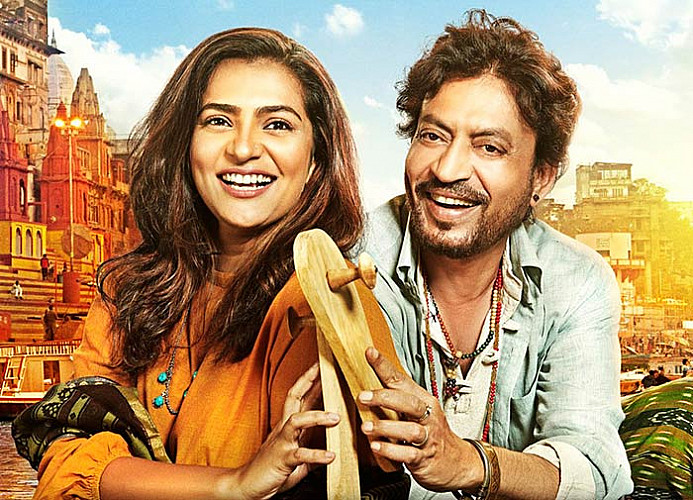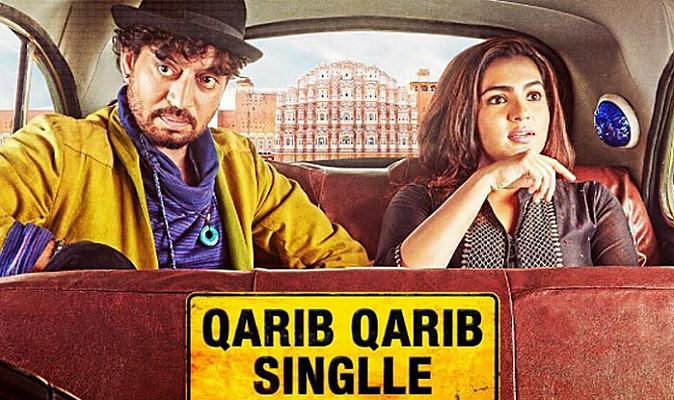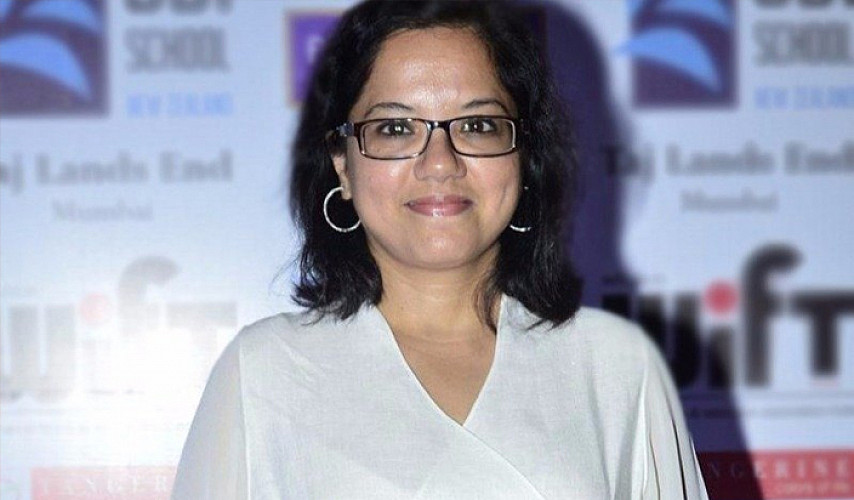How The Team Of Qarib Qarib Singlle Took Bollywood One More Step Qarib To Gender-Neutrality
Tanuja Chandra (direction and screenplay), producers Sutapa Sikdar and Shailja Kejriwal and Gazal Dhaliwal (dialogue and screenplay) gave us the Irrfan-Parvathy starrer Qarib Qarib Singlle (QQS), where we found yet another chorus of voices chiming in to confirm the relatively new status of women in the industry — as pros taking on retrograde notions, with élan.
Recently, we saw a solid team of women, masters at their crafts, put together a film starring Irrfan Khan, one of the finest actors of our times, opposite Parvathy, a promising fresh face from the South Indian film industry — and without a ‘star’ in their corner to level the playing field. The title, Qarib Qarib Singlle, piqued curiosity, without giving away much of the plot. Quirky promotional events that Khan dived into – like hosting a party for celebs who are single – added to the intrigue. The audience knew better than to expect a typical Bollywood flick, where cheesy oneliners and the 4 S’s — slapstick, songs, star power (mostly male) and stunts — would ultimately herald a ‘happy ending’. Going by the crew and the presence of Khan, the prediction was that it was going to be meaty, most likely in the vein of Piku (2015).
And it was, on many levels. This film stood for many things. For director Tanuja, this was a personal milestone. Though she is known to have an affinity for musical dramas, even having written the screenplay for one of the biggest hits of the ’90s, Dil To Pagal Hai (1997), it is her first romcom, a genre that she is keen to explore, before going back to her comfort zone of dark gritty dramas and crime thrillers. In that, it stands as an example of how stepping away from familiarity can yield rich and enriching results and open up new avenues.
For producers Sutapa Sikdar and Shailja Kejriwal, it was a new adventure as well, and a departure from their usual style. Sikdar, also Khan’s wife, is so selective that despite having given us gems like Khamoshi: The Musical (1996) and Kahaani (2012) as a dialogue writer, she has maintained a low profile. Working with intelligent directors like Sanjay Leela Bhansali, Sujoy Ghosh and Leena Yadav in the just-mentioned role, she only recently turned producer with her husband’s 2016 release Madaari. Though Kejriwal was the brain behind Zee’s Zindagi channel and the Pak-serial-fever — romance dramas mostly — that gripped India three odd years back (making the likes of Fawad and Mahira Khan household names almost overnight this side of the border), her filmography reflects more serious stuff. These mostly include a smattering of Pakistani productions, the only exceptions being Madaari (where she is also credited for the story) and an Indian short.
Dialogue writer Gazal Dhaliwal, who we have to thank for 2016 hits like Lipstick Under My Burkha and Wazir, has also collaborated on the screenplay with Tanuja, a friend. Witty, sharp and focused, with oodles of charisma, Dhaliwal may be relatively new to the industry, but has been swift in making industry insiders sit up and pay attention.
From choreographer and script supervisor, to production, assistant direction, domestic distribution and art direction, to the costume and legal departments, the crew has many women leading the way. What’s more, the story itself is credited to veteran writer Kamna Chandra, who has given us classics like Chandni (1989) as well as 1942: A Love Story (1994), and is the mother of Tanuja and her talented siblings. While both mother and daughter have had a part in narrating Yash Chopra romance sagas — which had the ’90s wrapped around their little finger — they have both broken away to make a mark in very different kinds of cinema.
The stories are worth telling. Of how these women, by dint of their capabilities, and while experimenting with different mediums, worked their way up to become powers to reckon with in their individual (and a few overlapping) domains. Some of them have collaborated previously, but this is the first time that they have linked up together to form an organic collaboration that reflects so much more than what we see on screen.
The last few years have seen a rise in women-centric films and the number of successful ‘women directors’ helming both mainstream and midstream cinema — movies that are more importantly trying to blur labels like alternate, art house, indie, niche, masala and commercial, to present intelligent storylines and riveting content. And what we love about these women behind QQS is their train of thought…the sense of humour, the sensitivity, and the points of view they bring to the table – in terms of narrative, characters, plot. Bring it on, we say!
Excerpts from our conversations with the four women behind QQS….
Tanuja Chandra: Director and Screenplay Writer
On what she hopes the audience is taking away… “My co-writer, Gazal, and I have been trawling the theatres over the release weekend and it has been a most surreal experience for me to sit with an audience, watching the film that I’ve spent the last three years working on. It’s a completely unusual relationship, the one between a film and its audience, one in which I play no part. And people have been laughing throughout the entire film, smiling away even during the serious bits. Gazal and I have turned to each other so many times, surprised, wondering, ‘This line too?’ So, I’m hoping they’ll take back with them this lightness of being, this feeling of joy and an undying wish to seek love.”
On calling it Qarib Qarib Singlle… “Most of us have past relationships that we carry with us long after they’re over. Sometimes the memories are good, other times, not so much. The man and woman in this story are ‘just about single’, not completely so, because of their past loves. The theme of the film is that while the world may philosophise that it’s good to forget the past, we must remember it, cherish it, embrace it and move ahead.”
On her first attempt at a romcom… “Thrillers with big drama is my comfort zone. And let me tell you a secret – it’s because I always found them easier to do than lighter films or romcoms. I didn’t dare to do a fun film till now and I’m so glad I did. There aren’t enough words to explain how you feel when you see people smiling through your film and coming out of the theatre all warm and fuzzy. I had thought I would go right back to my blood-and-gore films after this one, but now I think I’ll do one more happy film before returning to my comfort zone.”
On influences within the family… “My family is filled with storytellers. Starting from my mother right down to her grand-daughter, Zuni Chopra (daughter of sister and film critic Anupama Chopra and film-maker Vidhu Vinod Chopra), who has already had a published novel at the age of 16! So, the influences are all around. It all started at a young age as my parents used to spend their hard-earned money on books for us. When I wrote my first book, Bijnis Woman: Stories of Uttar Pradesh Told by My Mausis, Buas, Chachas, which came out earlier this year, my brother (author Vikram Chandra) was the first reader of the manuscript. While we don’t actively consult one another, and we don’t obsessively talk about films, it’s all there for anyone to absorb if they wish to. I’ve been influenced and inspired by each of them. Vidhu Vinod Chopra is one of the most experienced directors in the film business so I hold his advice in high esteem.”
On the strong women behind this film… “Yes, there has been quite a bit of female chemistry on our sets, and this includes Parvathy, our strong and intelligent female lead. Gazal, I’ve known the longest – over six years. We’ve collaborated on other scripts as well, but this is the first one that became a film. She is one of my dearest friends and is someone I love working with. I’m thrilled that people have loved her lines. Some that we never imagined would make people laugh have been earning abundant giggles!
I got to know Shailja and Sutapa only during the making of this film. Both are fiery, individualistic and creative women who were closely involved in the film. Shailja has been in the television industry for decades and brought all that experience to the table. Seema (Kashyap, art director) was also fun to work with. My costume designers, Maria (Tharakan) and Kirti (Kolwankar), are amazing women, as is the big group of female assistants, in all the departments. I love working with women – they’re tireless and enthusiastic teammates.”
On the industry’s changing attitude towards women… “A female film-maker faces the same obstacles that a man does. When I started out, no one stopped me; yes, some were slightly suspicious and cynical, but not in any grave manner. The real resistance, I feel, stems from how we are discouraged to share stories about women. These are deemed unprofitable by the trade and therein lies the issue. It all finally boils down to the budget and cast. This part I get upset about — there is a treasure trove of women’s stories out there that should be told. There are so many talented women who simply must come out and direct movies. Only when half the directors in the industry are women, will one be able to say something worthwhile has been achieved.”
On working with Irrfan Khan and Parvathy… “Irrfan’s acting is natural. He can totally surprise you with his reactions to a certain situation in a scene. He has great command over the language and is very good at improvising. He is completely focused. Parvathy brought the South Indian film industry ethic of hard work with her. Always on time, she stayed energetic through the day. She learnt her lines by heart because Hindi isn’t her first language and she dedicatedly followed the director’s instructions. I pushed her very, very hard but she was able to bear the pressure and came out with a wonderful performance. That says a lot about her.”
Next: Sutapa Sikdar
Related posts from Verve:
Verve Trending
Sorry. No data so far.
us on Facebook to stay updated with the latest trends









